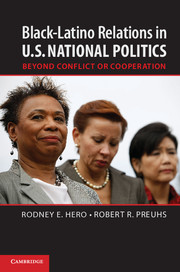Book contents
- Frontmatter
- Contents
- List of Tables and Figures
- Preface
- Acknowledgments
- Abbreviations
- 1 Introduction
- 2 What Previous Research Tells Us about Black-Latino Relations
- 3 Black-Latino Relations in Congressional Testimony and the Legal Arena
- 4 Salience and Congruence in Policy Positions
- 5 Black-Latino Relations in the U.S. House of Representatives
- 6 The Role of Group Interests and Ideology in Cross-Group Support
- 7 Further Explorations of Black-Latino Relations and Policies in National Politics
- 8 Conclusions
- Bibliography
- Index
5 - Black-Latino Relations in the U.S. House of Representatives
Published online by Cambridge University Press: 05 February 2013
- Frontmatter
- Contents
- List of Tables and Figures
- Preface
- Acknowledgments
- Abbreviations
- 1 Introduction
- 2 What Previous Research Tells Us about Black-Latino Relations
- 3 Black-Latino Relations in Congressional Testimony and the Legal Arena
- 4 Salience and Congruence in Policy Positions
- 5 Black-Latino Relations in the U.S. House of Representatives
- 6 The Role of Group Interests and Ideology in Cross-Group Support
- 7 Further Explorations of Black-Latino Relations and Policies in National Politics
- 8 Conclusions
- Bibliography
- Index
Summary
Thus far, we have examined relationships between minority advocacy groups as they seek to influence Congress and the Supreme Court. Most significantly, there was no evidence of conflict between blacks and Latinos in those endeavors, in contrast to what is widely portrayed in previous studies focused on urban politics. Instead, the evidence pointed to the general independence of policy positions, punctuated by cooperation on a relatively small set of policy issues when minority interest groups advocated on behalf of their constituents in the legislative and legal arenas. National advocacy groups represent a national geography of interests, of course. And thus the lack of conflict we have found so far may be dampened when localized interests pull policy advocates away from the singular national interests of the advocacy groups we have examined in Chapters 3 and 4. In this chapter we expand our investigation in important ways, focusing the analysis on another dimension of black-Latino relations – the voting behavior of members of Congress (MCs) on a distinct set of roll-call votes. That is, we shift from the role of important, though informal actors, advocacy groups, and examine significant actors who play fundamental roles in a major formal institution of the national government as elected representatives – members of the U.S. House of Representatives.
The electoral connection that purportedly dominates MCs’ behavior is one potential source that links mass-based conflict sometimes found in local geographic districts to national level politics (Mayhew 1974). Thus, it may be that MCs’ attention to mass preferences will reflect the conflict suggested in local level studies, even when national policy issues are addressed. Conflict could emerge as MCs are more influenced by, or beholden to, localized geographic interests than are national minority advocacy groups. On the other hand, it is arguable that MCs are at least partly removed or detached from certain direct local influences because of the different geographic breadth and the types of policy authority they have, along with the role of political parties and/or ideology in national governance – and these contrast considerably with the situation of local governments (and of mass attitudes). These various possibilities underscore the importance of closely examining minority (and white) MCs’ behaviors as part of our assessment of black-Latino relations at the national level.
- Type
- Chapter
- Information
- Black–Latino Relations in U.S. National PoliticsBeyond Conflict or Cooperation, pp. 114 - 147Publisher: Cambridge University PressPrint publication year: 2013

